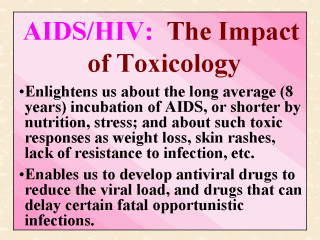 |
In a nutshell,
despite the fact that HIV is a slow-acting virus, it has a fatal effect on the immune
system because with time the latter is eventually unable to produce sufficient antibodies
to fight off any opportunistic infection. The incubation period of AIDS lasts an average
of about 8 years. Patients tested HIV-positive will eventually have the following specific
toxic responses: loss of appetite, weight loss, fever, night sweats, skin rashes,
diarrhea, tiredness, lack of resistance to infection, and swollen lymph nodes. Those who
have developed AIDS would have more severe symptoms. Usually, it is another opportunistic
disease, not the HIV per se, that ultimately cause death. There is evidence showing
that some cofactors such as nutrition, stress, and previous sexually transmitted diseases
can have an effect on HIV infection. An in-depth discussion of HIV infection and its
effects on the immune system is beyond the scope of this lecture. Nonetheless, it is
important to note that even though there has no cure yet for AIDS or HIV infection, some
effective therapies appear to be available for prolonging the life of AIDS patients or
delaying the onset of fetal opportunistic infections in AIDS patients. One treatment
method is the use of antiretroviral drugs to reduce the viral load in the body. Another
method is the use of drugs that can delay certain fatal opportunistic infections. The
important point being made here is that, it is toxicological tools and concepts that were
used to discovery HIV as the eventual causative agent of AIDS. Without this knowledge,
anti-viral or anti-opportunistic drugs would not have been made available these days. |
